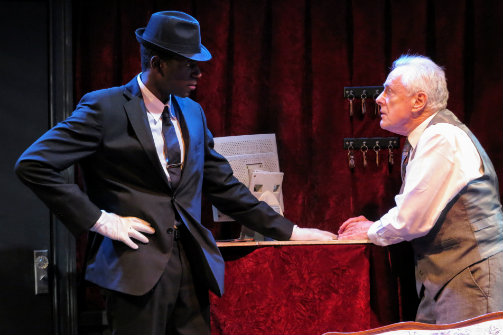Three on a Match
By Rhett Martinez; Directed by Eric Parness
Off Off Broadway, Play
Ran through 3.17.18
IATI Theater, 64 East 4th Street
by Dan Dinero on 3.19.18

BOTTOM LINE: A play with many interesting, if often conflicting, ideas, Three on a Match is a valiant effort at theatricalizing los desaparecidos (“the disappeared.”)
Argentina’s “Dirty War” (roughly 1976-83) is one of those world events that many U.S.-Americans know little, if anything, about. As was the case in other U.S.-backed dictatorships in South American countries, the military junta that controlled Argentina during this period “disappeared” tens of thousands of students, activists, union members, religious figures, and anyone else thought to have “dangerous” leftist views. In Three on a Match, playwright Rhett Martinez attempts to tell a metaphorical, rather than literal, story from this world.
Somewhere in present-day South America, the three remaining residents of a run-down hotel do their best to remain civilized while the “Glorious Revolution” rages outside. The Haberdasher (Angus Hepburn) appears to be a British ex-pat who fought in the “Great Good War,” although there may be some things he isn’t telling us. The curiously forgetful Queen of Isla Colinas (Elisa de la Roche) fled to this country after her island nation sunk beneath the waves. And The Girl Bellboy (Rosa Rodriguez), whose parents were disappeared by the current regime, does her best to serve tea and keep up appearances, although she never says a word.
Into this small group comes The American (Sean Phillips), a man who won’t let a shuttered hotel keep him from securing the room he reserved. As soon as The American enters, he attempts to do what Americans so often do in foreign lands—take over. But although he terrorizes and debases each of the residents, soon the tables turn, and, as Martinez writes in his program notes, “the oppressors finally get what they deserve because the oppressed find the courage to rise.”
There are some lovely moments here. The Haberdasher’s daily paper has large holes cut in each page; as he says “the holes are the only part that tell the truth.” While this is a memorable illustration of censorship, it also hints at the ways in which such regimes have destroyed government records, removing any trace of “the disappeared” from their archives. While the play aims for a more stylized, quasi-absurdist tone (director Eric Parness does a good job at making this both coherent and consistent), there are a few moments of helpful lucidity, as when the concept of “the disappeared” is explicated for the audience. All of the design elements (especially the sound design by Haydn Diaz and Gabriel García) are effective, although perhaps the visual elements could be further heightened—the censored newspaper and outsized government decrees (props by Gabriel García) are so enjoyable, they left me wanting more.
As The American, Phillips, who enters with a very American swagger that is at once both seductive and horrifying, is excellent. And although not every actor is fully at ease with the non-realism needed here, Phillips is especially adept at navigating the play’s tonal shifts. Even though The Girl Bellboy is silent for most of the play, Rodriguez’s moving performance makes a strong argument that perhaps this character should play a more central role in this tale; her song near the end is particularly haunting.
Still, while Three on a Match tries not to be too literal, two of its characters are from real countries, and the muddiness with which this play treats global politics leads to some confusing, if not downright confounding, situations. Why is a British ex-pat immediately deferential to an American tourist? Just because they disagree with the current regime, are The Haberdasher and The Queen, both of whom exhibit trappings of money and class, really “the oppressed”? What does it mean that The Girl Bellboy, the only native of this unnamed country, is a silent servant, and that it's a white British man who speaks for her? And what about the scenes where The American, who is black in this production, becomes increasingly sexually aggressive in his interactions with the two (essentially white) female characters before he is bound, beaten, and tortured? (I couldn't help thinking about Emmett Till, which I don't think was intentional.)
It seems as if Martinez and Parness are aiming for a play that elicits more questions than answers, and certainly, this is a laudable goal. One just wishes they had thought through some of the ramifications of their choices more fully, or else given the audience more clues as to how to interpret them. If I had to guess, perhaps one takeaway is that those who live in a dictatorship can’t prevent themselves from being complicit in it. There are also the ways in which Three on a Match riffs on the concept of “disappeared,” including The Queen’s tale about the disappearance of her island nation, a story that echoes present-day concerns about global warming and climate refugees. So perhaps, rather than read what happens to The American is as “the oppressed find[ing] the courage to rise,” we can instead draw parallels to the “disappearances” that happen every day to black folk in the U.S.? It’s certainly a lot to think about.
(Three on a Match played at the IATI Theater, 64 East 4th Street, through March 17, 2018. Running time was 85 minutes, no intermission. Performances were Thursdays through Saturdays at 8, Sundays at 3. Tickets $30; $25 students and seniors. For more information visit iatitheater.org.)
Three on a Match is by Rhett Martinez. Directed by Eric Parness. Scenic Design by G. Warren Stiles. Lighting Design by Miguel Valderrama. Costume Design by Viviane Galloway. Prop Design by Gabriel García. Sound Design by Haydn Diaz and Gabriel García. Original Music by Haydn Diaz and Gabriel García in collaboration with Rosa Rodriguez. Fight Choreographer is Alberto Bonilla. Stage Manager is Maxwell A. Waters. Assistant Director is Anna Hogan.
The cast is Rosa Rodriguez, Angus Hepburn, Elisa de la Roche, and Sean Phillips.

